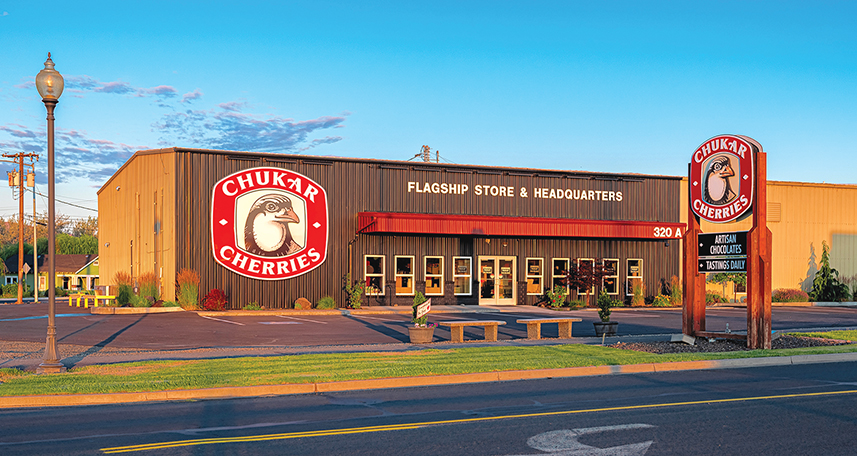
Home » Port of Benton: Critical foundation in place for 2021 projects
Port of Benton: Critical foundation in place for 2021 projects

October 15, 2020
The first months of 2020 welcomed new members to the Port of Benton “We were in the middle of a transition,” said Diahann Howard, executive director for the port, whose jurisdiction includes a population of about 56,050 and a budget totaling $14 million in 2020.
Howard, who became executive director in December 2019, hired a new core team: Joe Walker, airport manager; Ron Branine, facilities manager; Miles Thomas, director of economic development and governmental affairs; Danielle Connor, director of finance/auditor; and Summers Miya, administrative technician.
“We were retooling our new team and kind of hit the ground running on some marketing and communications that we had started working on … And then Covid hit,” Howard said.
The port had been working on improving digital communications — with the community and between team members, she said.
The pandemic accelerated the port’s transition to cloud-based business operations, videoconferencing and remote-work options.
“We took it as an opportunity to just continue along the path of assessing the port’s needs as an organization,” she said.
Though the statewide construction gridlock and social distancing mandates put many of the port’s capital projects on hold, Howard said the team was able to put added focus on tending to tenant needs.
It also worked to train staff and streamline procedures and tools for managing properties, buildings and maintenance schedules.
This included an updated enterprise resource planning finance system.
“(It’s) all cloud-based and will be integrated with facilities and maintenance, and that’s also integrated with all 200 leases and real estate,” Howard said.
Thomas said the new system automates a lot of the processes around tenant relations and allows port staff to respond more efficiently.
Another important project undertaken during the state’s lengthy stay-home order was updating the port’s website and improving communication with tenants and the community.
The new website highlights more interactive details about the port’s various facilities, operations and private investment opportunities. The port also has turned its monthly newsletter into e-communication.
“We saw a 159% increase in our subscriber base,” Thomas said.
More airport updates
Before Covid hit, the port completed $350,000 in pavement maintenance at its airport facilities.
One of its 2020 goals was beginning the master planning for the Richland Airport, which will continue into 2021.
Howard said only a couple of hangar spaces are available and noted an increasing need for a longer runway and other minor modifications to accommodate larger aircraft.
“That’s the importance of the new master plan work that’s being done, so that we can identify areas for future opportunities and growth,” she said.
She said the port is investigating options that could expand the airport to the west.
At the Prosser Airport, five or six new 60-by-60 hangar spaces are planned for 2021 and currently in design. The port expects to receive funding assistance from the Federal Aviation Administration.
Howard said another port goal is to better serve both general aviation and corporate business fliers.
“You’ll see us trying to be more focused on trying to recruit businesses—maybe they fly in or fly out, but using Richland or Prosser as a location for their company.”
The airports include a lot more than just general aviation, Thomas said.
“We support the Life Flight operations that go between Richland, Prosser and the other parts of the state … We have a lot of commercial facilities in both Prosser and Richland that are either aviation hangars, some are commercial space, or industrial space for small businesses. We have several rentals at both airports between the land and buildings.”
The port is conducting a study led by a Colorado-based consulting firm to provide guidance for commercial development at the airports over the next 15 to 20 years, as well as to communicate to the FAA the airports’ ongoing need of the Richland and Prosser airports.
Airport revenue must be reinvested in the airport.
“We just really want to make sure that we’re being good stewards of those assets,” Howard said.
Another major transportation sector project that the port undertook in 2020 was a $2 million renovation and safety update to the Yakima River rail bridge near its confluence with the Columbia River.
North Richland opportunities
The port continues to work toward developing the 1,341-acre parcel that was transferred and divided equally between the port and city of Richland in 2015.
This year it will apply to Washington’s Community Economic Revitalization Board and the U.S. Economic Development Administration for grants to help pay for the extension of 5,500 feet of sewer infrastructure to serve the first 600 acres.
The city and port each will contribute $400,000 to the $4.4 million project.
“We have already had interest in the property, but we really need the sewer to really be able to respond to any real inquiry,” Howard said.
“The other thing we did in 2020, was after a multiyear effort and working with Congressman Dan Newhouse, was to remove deed restrictions and move the port’s 72-acre Richland Industrial Center out of the Port Conveyance Program that was under Maritime (Administration),” she said.
“It was $3 million, but what it has done is open up that property now so that we can more actively market and use it for recruiting for renewable energy, advanced manufacturing and commercialization.”
The port also is looking into development options for 14 acres of waterfront south of Battelle Boulevard.
“What can we do to make sure it’s impactful to help kind of complete or be a key cornerstone of the Research District master plan?” Thomas asked.
Looking ahead
Some other accomplishments from the past year include a renovation of the exterior façade of Chukar Cherries’ flagship store and headquarters in Prosser and repairing and cleaning up Crow Butte Park west of Paterson.

Howard said that for 2021, the port will be filing for another state grant to replace the park’s circa-1976 entry station. The estimated project cost is $300,000 to $400,000, and the port will match 25%.
Looking to 2021, Howard said, “We know there will be impacts and (we) are planning a conservative budget while remaining optimistic as we seek ways to support economic recovery post-Covid.”
As for capital projects, the port is advancing projects in its pipeline.
“We have a lot of potential projects … about $7 million of potential grant projects,” she said.
Overall, the Port of Benton team is proud of the past year’s advancements despite setbacks posed by the pandemic. Officials are optimistic about what’s ahead in 2021.
“If anything, I think 2020 is going to be our year of preparation and resiliency for 2021,” Thomas said.
Construction + Real Estate
KEYWORDS october 2020





